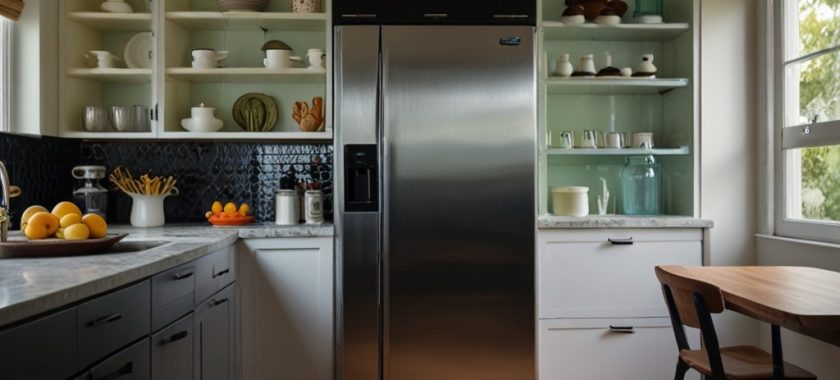A refrigerator that suddenly stops cooling can cause major frustration, especially when it puts your food at risk of spoiling. If you’re dealing with a fridge not cooling, you’re not alone. There are several reasons this issue can arise, and in this article, we’ll explore some of the most common causes and what you can do about them.
⠀
-
Blocked Air Vents
⠀
One of the most common reasons for a fridge not cooling properly is blocked air vents. Refrigerators rely on a consistent flow of cold air between the freezer and fridge compartments. If food items are placed too close to the vents, airflow becomes restricted, preventing the appliance from maintaining the correct temperature.
⠀
What to Do:
Check the air vents inside your fridge and freezer to ensure they are not obstructed by food. Rearrange items to allow for proper airflow.
⠀
-
Dirty Condenser Coils
⠀
Condenser coils, usually located at the back or bottom of the refrigerator, are responsible for releasing the heat from inside the fridge. If these coils are covered in dust or dirt, they can’t function properly, causing the fridge to overheat and stop cooling.
⠀
What to Do:
Unplug your refrigerator and clean the coils using a vacuum or coil cleaning brush. Make sure to perform this maintenance regularly to avoid future issues.
⠀
-
Faulty Thermostat
⠀
The thermostat regulates the temperature inside your refrigerator. If it’s faulty, your fridge may not be cooling as it should, or it could be cooling too much. A broken thermostat can disrupt the refrigerator’s ability to maintain an optimal temperature.
⠀
What to Do:
Check the thermostat settings. If the temperature is set correctly but the fridge is still warm, the thermostat might need replacing. You can consult a professional technician for an accurate diagnosis.
⠀
-
Evaporator Fan Problems
⠀
The evaporator fan circulates cold air from the freezer to the fridge compartment. If this fan fails, your freezer may stay cold, but your fridge won’t receive the necessary air circulation, leading to a fridge not cooling properly.
⠀
What to Do:
If you notice strange noises or find that the freezer is cold but the fridge isn’t, the evaporator fan might be the culprit. It’s best to contact a professional for repairs or replacement.
⠀
-
Problems with the Compressor
⠀
The compressor is the heart of your refrigerator’s cooling system. If it’s not working correctly, your fridge will stop cooling altogether. A malfunctioning compressor could be due to electrical issues, overheating, or wear and tear.
⠀
What to Do:
If you suspect a compressor issue, it’s best to leave it to the experts. Attempting to fix it on your own could cause further damage. Call a professional repair service to inspect the compressor.
-
Low Refrigerant Levels
⠀
Refrigerant is the substance responsible for absorbing heat and cooling the fridge. If there’s a leak or insufficient refrigerant, the fridge won’t be able to cool effectively.
⠀
What to Do:
A refrigerant leak is a more complex issue that requires a professional technician. They can locate and fix the leak, as well as refill the refrigerant.
⠀
-
Door Seal Issues
⠀
A faulty door seal, or gasket, can also be the reason your fridge is not cooling efficiently. The gasket ensures that cold air stays inside the fridge while preventing warm air from entering. If the seal is damaged or worn out, cold air will escape, making the fridge work harder to maintain its temperature.
⠀
What to Do:
Inspect the gasket for any cracks, gaps, or signs of wear. If you notice any damage, replacing the seal is a quick fix that can improve your fridge’s cooling performance.
⠀
-
Incorrect Temperature Settings
⠀
Sometimes the issue is as simple as having incorrect temperature settings. If the thermostat dial is accidentally set too high, your fridge may not cool sufficiently. Additionally, extreme external temperatures, such as in hot kitchens or during heatwaves, can also affect the internal temperature of the refrigerator.
⠀
What to Do:
Check the temperature dial and ensure it’s set between 35-38°F (1.6-3.3°C) for optimal cooling. If your kitchen environment is particularly warm, you may need to adjust the settings slightly to maintain the desired internal temperature.
⠀
-
Clogged Defrost Drain
⠀
The defrost drain helps remove excess condensation and prevents frost buildup inside the fridge. If this drain becomes clogged, water can accumulate inside the fridge, which can affect its cooling performance and lead to a fridge not cooling properly.
⠀
What to Do:
If you notice water pooling inside the refrigerator, the defrost drain could be blocked. You can try cleaning it with warm water or use a pipe cleaner to remove any obstructions. If this doesn’t solve the issue, consider calling a professional repair service for assistance.
⠀
By addressing these common problems, you can resolve most cooling issues and keep your fridge running smoothly. However, if your fridge still isn’t cooling properly after troubleshooting, professional intervention may be needed to avoid long-term damage.
⠀
If you’re struggling with a fridge that isn’t cooling properly, don’t hesitate to contact Chula Vista Appliance Repair Company. We’ll diagnose the problem quickly and get your refrigerator back in working order.
Contact us
(619) 880-5508


